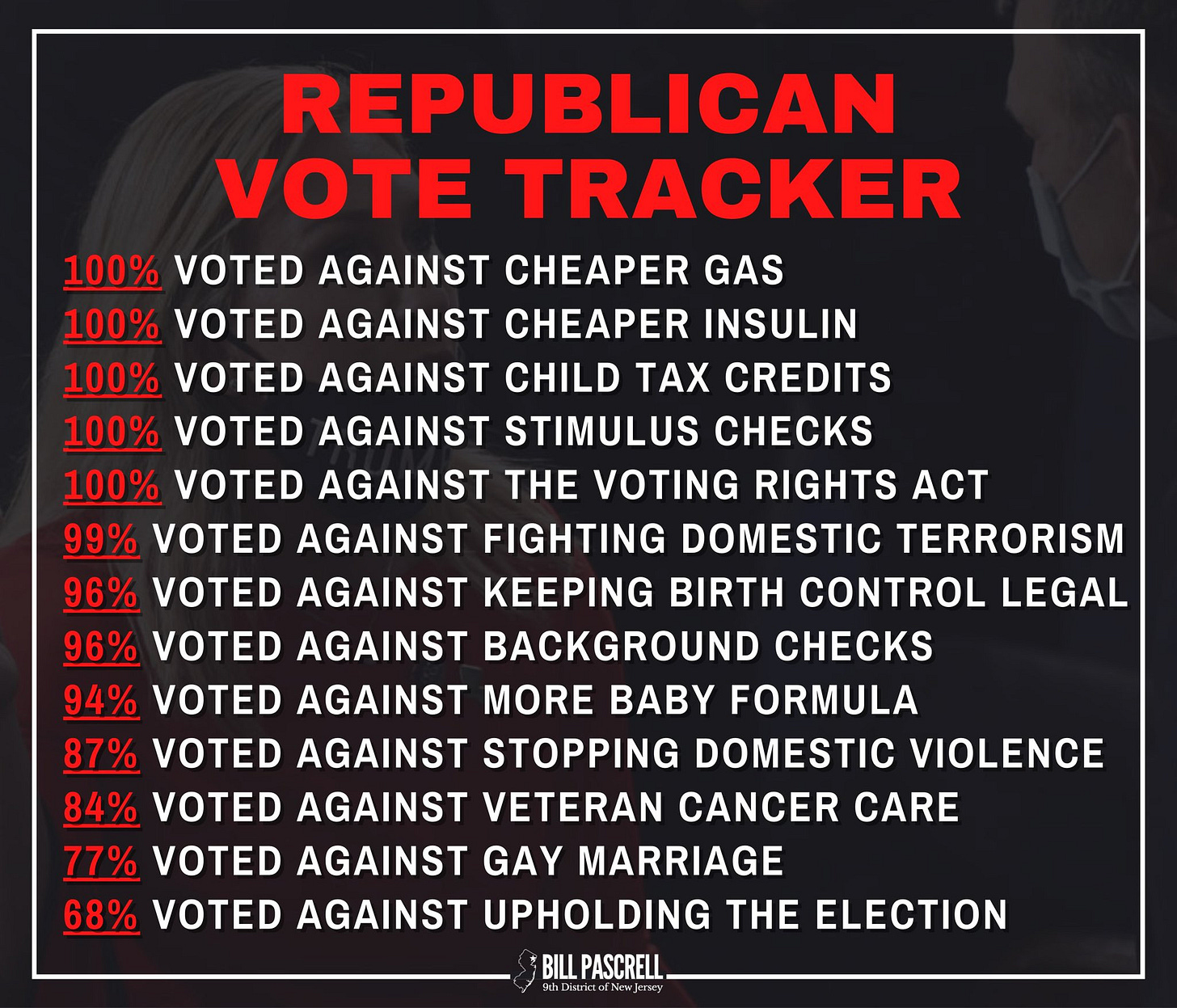Republicans Aren't Hypocrites; They're Just Cruel
On "debunking" content, knowing your audience, and instructional design.
Real quick up top: you can now sign up for my summer course on plastics! This course is worth actual college credit and will teach you everything you need to know about how plastics are made, what makes them unrecyclable, and what we can do about it. You don’t even need to be a current Five College student to take it! Learn more about how to enroll here and check out the course syllabus on my website. Thanks!
*content warning: transphobia, racism, general Republican cruelty, brief mention of SA*
One popular style of left-leaning content is to point out the perceived hypocrisies in conservative logic.
Republicans claim to want to “protect kids” when it comes to preventing them from access transition care, but consistently defund child care programs, have yet to pass comprehensive gun reform, and seem to want to send kids to work in dangerous environments. They claim to want small government and more individual liberty, while arguing for increased police budgets and other authoritarian policies. They call Democrats child predators while excusing (or ignoring) the rampant abuse in the Catholic Church and even within their own party. The list goes on. Pointing these out has become a past time for us on the left half of the political aisle, and it might even convince otherwise politically-inactive people to hear out our side of the story on some pretty important issues. Many of my own videos tackle their hypocrisies head-on, as do many political campaign ads:

Here’s the unfortunate truth of the matter: pointing out these “inconsistencies” doesn’t actually change the minds of any conservatives.
It’s tempting to believe that conservatives believe the same fundamental things that liberals/leftists do, but they merely “lack the facts” to come to the same conclusions as us. If only they knew that transition care saves lives, if only they knew that alternatives to police are incredibly effective, so on and so forth. But this strategy doesn’t align with the reality of what it means to change someone’s mind.
As a case study, let’s compare two Republican “hypocrisies”. Here are two mainstream Republican positions:
Teenage transmasculine people should not be allowed to receive gender-affirming care because they are too young to make an informed decision on a permanent, life-altering process.
Teenage girls should not be allowed to receive abortions because if they get pregnant, it’s their fault and as grown-ups they should have to deal with the consequences (even in cases of rape, abuse, etc.) Once you are able to become pregnant, you are old enough to take responsibility and/or start a family.
In our minds, these beliefs are directly contradictory. Having a child is a life-changing process, not only for what it does to your body but in that it also leaves you with a human child to care for (and, in fact, the puberty blockers given to trans teens are completely reversible). So either a) minors are able to make the decision to change their bodies how they like or b) they aren’t. Pick one. Us lefties understand politics and human decision making in terms of bodily autonomy, something we value a lot, so we generally lean towards allowing (legalizing/decriminalizing) both gender-affirming care and abortions.
However, conservatives don’t see these two beliefs as contradictory at all. That’s because their value system is completely different than ours.
Here’s how they would explain the same two beliefs:
Teenage girls shouldn’t be allowed to permanently damage their bodies by taking hormones and getting surgery. Transness isn’t real and confused young girls are being misguided by gender ideology.
Teenage girls shouldn’t be allowed to get abortions because abortion is wrong and unborn life should never be terminated under any circumstances.
Notice how “transmasculine people” becomes “misguided teenage girls”, because of 1) transphobia, the belief that transition care is not considered a legitimate medical practice and 2) misogyny, the belief that girls are frail, emotional, and can’t make decisions on their own. Also, conservatives don’t see abortion as an issue of individual bodily autonomy, they see it as an issue of morality; it’s murder, and murder is wrong.
There’s something else here too, something more fundamental: conservatives, including and especially women, view women as baby-making machines. Just look at how they talk about trans men: they’re always “damaged”. To paraphrase an excellent Lily Alexandre video (below), it is incredibly weird to describe a human being as “damaged”. A tool can be damaged—a pair of scissors can fail to cut something—and even an organ can be damaged—your heart can fail to pump blood as effectively—but saying that a person is “damaged” implies they have a “function” to fulfill. While leftism is a largely agnostic movement, most conservatives have some belief in destiny, some belief that we are put here for a reason, to fulfill some grand purpose. A belief in “destiny” is not necessarily harmful in and of itself, but it does become dangerous when one’s idea of “destiny” means controlling others. In my own country, Christianity has been the justifying ideology for colonialism (“manifest destiny”), patriarchy (where men’s capacity for leadership and women’s capacity for breeding is cosmic and unchangeable), and several other manmade horrors.
To reframe the conservative argument:
Women are supposed to make babies, the ability to medically transition threatens that, therefore we should opposed transition care.
Women are supposed to make babies, the ability to get an abortion threatens that, therefore we should oppose abortion.
There is also something to be said for the role of white supremacy here: the idea that women are baby-making factories is rooted in the idea that white women were destined to further the white race and that Black women (who arguably weren’t even seen as “women” because they weren’t seen as human) were destined to maintain the population of enslaved people. Either way, the point of controlling people’s bodies is to maintain existing power structures, a machinery of imperialism that keeps cis white men at the top and profiting off the labor of everyone else.
Isn’t the current gender system exhausting?
Some additional facts we should sort out before moving on:
Some trans men are actually able to get pregnant, usually by stopping their hormone regimens for a while.
Teenagers generally aren’t given gender-affirming surgery except in extreme circumstances, with many transitioning socially (not medically) and others only given puberty blockers, which a) delay puberty until they are old enough to make a more-informed decision and b) have effects that are 100% reversible, although with the risk of being a “late bloomer”, a fate that’s somewhat embarrassing but significantly easier than going through the wrong puberty and paying thousands of dollars to reverse those effects.
The foundation of the movement for accessible birth control had some roots in eugenics, a history which we should acknowledge and grapple with. Similarly, this country’s history with forced sterilization of people of color is relevant to many people’s perceptions of abortion care, and to ignore those perspectives is reductive and unempathetic.
These facts matter, and if our goal is to onboard more people into The Movement, we should be able to reference them at a moment’s notice. That said, we also shouldn’t kid ourselves by believing that facts alone can change someone’s mind. What matters isn’t just an intellectual argument, but an emotional/spiritual one: the Right values their beliefs in destiny, simplicity, and power more than they value bodily autonomy, nuance, and equality. If you want to convince someone to be on our side, you must understand where they’re coming from.
We live in an era where the perspectives of trans people and women are more accessible than ever: just hop on TikTok and you’ll be met with hundreds of thousands of people simultaneously screaming some version of what I laid out above. Yet still, in the general public, trans people are more misunderstood and maligned than ever, and misogyny in general remains rampant. Part of this has to do with our algorithm-based media diets: thanks to the recommendation systems built into every social media network, you never have to hear the perspective of a trans person if you don’t want to. That’s why I encourage you all to #ChangeYourAlgorithm and follow some trans creators (not just me!) Another factor is that talking through the Internet is a bad way to change minds. We can make video after video about our lives, making the same arguments over and over, but blasting out content to a general audience fails at the very first step in instructional design: identifying your audience.
Here in STEM education land, where most of my time is spent, the way you walk someone through a math problem should change depending on whether you’re talking to someone who’s taken Calculus or not. Similarly, the way you attempt to shift someone’s mindset into some level of trans acceptance should change depending on whether you’re talking to (A) an atheist lesbian who isn’t sure how her attraction to trans people fits into her sexuality versus (B) one of the 55% of Americans who believe that angels are real and influence daily life.
I’m not going to sit here and tell you that the only reason transmisogyny still exists is because “feminists have done a bad job of explaining their views to people”; patriarchy is a global world order that is self-sustaining as much as it is self-immolating. That said, I am becoming increasingly disillusioned with social media as a leftist propaganda machine. You really don’t know what’s going to change someone’s mind until you’re in conversation with them, seeing what they respond to, engaging with what they truly believe about human nature, taking note of what what they’re willing to accept, and making peace with what they’re unwilling to accept.
I was once giving a presentation to a group of cis people about my experience as a trans person navigating health care and legal systems at a conference on public health at UConn. I recounted all sorts of wild experiences with transphobia, misogyny, medical gatekeeping, and other forms of discrimination, which they nodded along to just fine. But there was one thing that made everyone in the room truly shift in their seats, something shocking that left everyone wide-eyed, and it was something I didn’t expect to resonate with them so strongly: telling them how much money it cost to legally change my name. Between the probate court document (I needed to raise my hand in front of a judge and promise her I wasn’t changing my name to commit tax fraud), new SSN card, new driver’s license, and new passport, the whole process involved spending nearly a thousand dollars, not to mention taking tons of time off work to wait in lines at government offices.
To me, this was just a fact of life, yet another set of hoops to jump through. But to my cis audience, my story made an element of trans existence in the modern age readily apparent: this shit is expensive. Maybe they thought that transitioning is something one does on a whim without giving it much thought, like trying on a new style of jeans or a new haircut. Not at all: by the time you’re spending hundreds of dollars on a legal document, you’re pretty damn sure that this is something you need to do. Maybe they made the connection that I would soon make about our gender/legal system: changing your name when you get married is 100% free, and it may as well be just as much of a social convention as changing your name when you change genders, but only one type of name change is seen as legitimate by The State while the other is assumed to be a threat, perhaps an attempt at tax fraud. Maybe it just served to humanize me: instead of allowing their imagination to run wild about whatever debauchery they assumed I got up to as a filthy transsexual based on whatever bigoted stuff they read online, they were now envisioning me, this flesh-and-blood trans person they could interact with, standing in line at the DMV, a situation as universal as it is mundane.
Either way, it got everyone talking, and better yet, thinking. I had come to this talk prepared with an arsenal of pro-trans rhetoric and riveting tales of discrimination at the hands of doctors, ready to tell my audience about how my experience moving through the world was fundamentally different than theirs. But the best thing I did to sell them on trans acceptance was share something incredibly human and relatable, something I never would have thought to bring up if it never came out organically through an honest and humble conversation.
Nowadays, when I give talks about trans acceptance to universities (you can hire me too, by the way!!) I mention the cost of transition, both the social cost and the financial cost. It’s something that connects me to others—we’ve all been to the DMV, we’ve all had to spend way too much money on something we definitely needed and probably ought to be free—while also breaking down conservative talking points about what motivates trans people to change. It’s been a far more effective use of my time than pointing out the “hypocrisies” of people who think their cruelty is 100% justified.
I no longer want to spend hours of my time justifying my humanity to people who will never accept it. I no longer want to “debunk” conservatives on the Internet. I want to live, I want to be human, I want the messiness and the joy and everything in between. I seek only to be understood. If you’re seeking the same thing—and if you’re human, they you probably are—then let us find understanding in one another, let us be together, breathing in each other’s complexities and histories, leaving it all out on the table.
My liberation is your liberation. Facts may not care about our feelings, but I am not a fact; I care about your feelings, and in fact, our feelings are facts. The antidote to conservative cruelty is, as always, radical love. Let’s learn together.
Currently Reading
Joesph Valle, a researcher at UMich, did their entire dissertation on abolitionist engineering. This is right up my ally!! I’m going to be spending my whole summer pouring over this; if you are too, hmu!
CJ the X, one of my favorite creators, just started their own Substack, and it speaks to my soul. They have been hugely influential on me as an artist!
Related to the above op-ed: a piece on conservative ideology and the adoption of electric vehicles.
I got to see my students graduate last Friday, and our ChemE class picture is the headliner here!! What a way to end my first year of teaching, I loved these students so much :)
Watch History
An absolutely essential video essay about sex positivity and queerness (which I touched on a bit last week).
If you like content about content, an empathetic response to cancel culture and making mistakes online.
A deep dive on how Pluto’s status as a planet was revoked, featuring astronomer drama.
Bops, Vibes, & Jams
The new Deja Vu track “No Waiver” is excellent! Deja is a local Western MA rapper who I promise is going places.
The new Arlo Parks album is even better than the last, a stunning and atmospheric masterpiece. Fav tracks: “Devotion”, “Weightless”, and “Pegasus ft. Phoebe Bridgers”.
Last night I went to the Asparagus Festival in Hadley and got to hear Boston rock trio The Wolff Sisters! Their new album Dark River is out now!
And now, your weekly Koko.
That’s all for now! See you next week with more sweet, sweet content.
In solidarity,
-Anna





